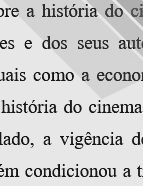

................................
Among dozens of recent publications available in the publishing market on the history of Portuguese cinema, the following are worthy of note, particularly for their historicising occurrence and scope: A Invenção do Cinema Português [The Invention of Portuguese Cinema], by Tiago Baptista (Tinta-da-China. 2008); the two volumes of Cinema Português. Um País Imaginado [Portuguese Cinema. A Country Imagined], by Leonor Areal (Edições 70. 2011); Viagens, olhares e imagens [Travels, visions and images], organised by Sofia Sampaio (Cinemateca Portuguesa. 2017); and Uma nova história para o novo cinema português [A new history for the new Portuguese cinema], by Paulo Cunha (Le Monde Diplomatique/Outro Modo. 2018).
In this last period, from 1992 to the present day, the history of Portuguese cinema has experienced a diversity and scientific enhancement fostered above all by the academy, which has enabled a transdisciplinary action - with anthropology, architecture, sociology and philosophy, among others. This has served to definitively transform historiographical practice in Portugal, with a clear shift away from the pseudo-authors and those committed to the object who had spearheaded the publications of the initial phases. Promoted within the scope of individual projects (master's theses or doctoral dissertations) or as part of collective initiatives (research projects or the transfer of knowledge to the community), a vast bibliographic production based on scientific methodologies has returned to the sources and proposed a revision of the knowledge that is gradually being transmitted by academia and reaching the publishing market, also contributing to its dissemination in the artistic and cultural arenas.
Over recent decades, the production of knowledge on Portuguese cinema has become diversified and benefitted from the contribution of other scientific and disciplinary areas, essentially reflecting the professional and intellectual acumen of its authors and the degree of personal, economic and corporative commitment to the object of study itself. During the first decades, whether directly or indirectly, the State controlled the narrative that progressively became consolidated, ensuring its institutionalisation, first through the SNI then, after the fall of the Estado Novo dictatorship, through public entities such as the Cinemateca or the successive Institutos de Cinema.
